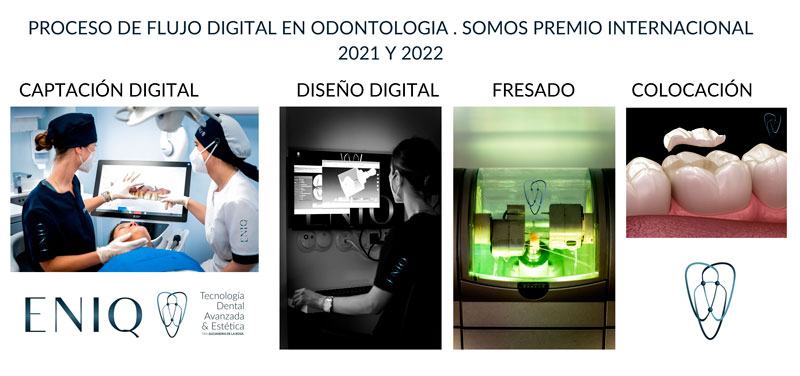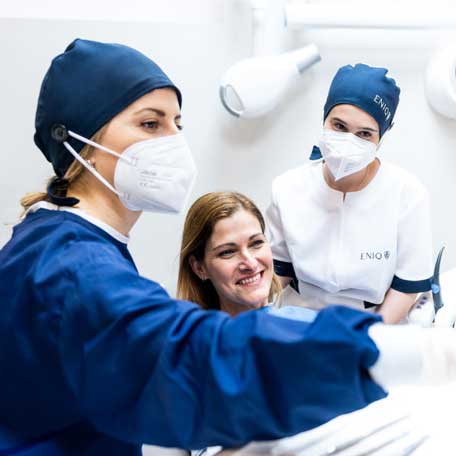

Fixed Prostheses on Teeth
Fixed prostheses on teeth, combining aesthetics and functionality
What is a fixed prosthesis?
A fixed dental prosthesis is a dental restoration used to replace one or several lost teeth. It consists of a structure that is permanently fixed to the natural teeth adjacent to the edentulous space (where the tooth is missing) using dental cement or an anchoring system.
We explain the process in detail.
What types of fixed prostheses on teeth are there?
Fixed dental prostheses are devices that are cemented or permanently attached to natural teeth or dental implants to restore dental function and aesthetics. There are several types of fixed dental prostheses, each designed to address different needs and clinical situations. Some of the most common types of fixed dental prostheses include:
- Dental crowns: Dental crowns are protective covers placed over a natural tooth or dental implant. They are used to restore the shape, function, and appearance of a damaged, weakened tooth or one with a large previous dental restoration. Crowns can be made from different materials, such as porcelain, metal (like gold or noble metal alloys), or zirconia.
- Dental bridges: Dental bridges are prostheses used to replace one or more missing teeth. They consist of one or more artificial teeth (called pontics) that are attached to crowns placed on adjacent natural teeth or dental implants. Bridges can be of various types, including traditional bridges, cantilever bridges, and adhesive bridges.
It is important to note that the type of removable prosthesis recommended can vary according to the individual needs of the patient and the health of their oral tissues. Consulting a dentist or dental prosthetist to determine the most suitable option for each case is crucial.

Duration
How many appointments do I need to attend to get a dental bridge?
It depends on whether any other prior treatment is needed, but once the bridge is carved, a provisional is placed in a couple of hours, and the patient is scheduled for a structure trial and another day for the ceramic trial, totaling four or five appointments.
With the technology we have at ENIQ, we can definitively cement your bridge in a maximum of two days. No unpleasant alginate and silicone impressions, using only photographic scanning of your teeth. Likewise, we can guarantee, if necessary, a provisional bridge with the highest aesthetics on the market made the same day.
The number of appointments required for the placement of a fixed bridge on teeth can vary depending on several factors, such as the patient's oral health, the complexity of the case, and the dentist's approach. Generally, the process of placing a fixed bridge may require at least two or three appointments.

General process of the typical appointments involved in placing a fixed bridge:
By placing the prosthesis the same day as the implants, the patient's aesthetics lost due to the lack of dental pieces are restored, and in many cases, the need for removable prostheses that have to be removed for cleaning and highlight the absence of teeth is avoided.
At ENIQ we do it with guided navigation, which allows for placement with a 3mm incision, without suturing and with minimal postoperative discomfort
-
Initial consultation:
In this first appointment, the dentist will assess your oral health, examine the involved teeth, and discuss treatment options with you. X-rays and/or dental impressions will be taken to get a clear picture of your mouth and plan the appropriate treatment.
-
Preparation of the supporting teeth:
In this appointment, the dentist will prepare the adjacent teeth that will serve as support for the bridge. A small amount of dental enamel will be removed to create space for the placement of dental crowns. Precise dental impressions will be taken to serve as a basis for manufacturing the bridge in the dental laboratory.
-
Placement of the bridge:
In a subsequent appointment, the dentist will place the bridge in your mouth to check the fit and appearance. Necessary adjustments will be made to ensure that the bridge fits properly. Once the fit is satisfactory, the bridge will be cemented or adhesively bonded in place permanently.
What types of fixed prostheses are there?
THREE TYPES
Dental Crowns
They are caps placed over natural teeth to restore their shape, size, and function. Crowns can be made of porcelain, metal-porcelain, or zirconia, and are used to protect weakened teeth, restore fractured or discolored teeth, or as supports for dental bridges.
Dental Bridges
They are prosthetics used to replace one or more consecutive teeth. They consist of artificial teeth suspended between two crowns that are cemented onto the adjacent natural teeth. Dental bridges can be made of porcelain, metal-porcelain, or zirconia, and provide an aesthetic and functional solution for replacing lost teeth.
Dental Veneers
They are thin sheets of porcelain or composite resin that are adhered to the front part of natural teeth to improve their aesthetic appearance. Dental veneers are used to correct issues such as stains, discoloration, malformations, or gaps between teeth.
+??%
What is the success rate of a fixed bridge?
The success of a fixed bridge can vary significantly based on several factors, such as design, quality of materials, oral hygiene, and the patient's habits.
It's not possible to provide an exact success percentage for all fixed bridges, as each structure is unique and subject to different variables.
What are the benefits of getting a fixed bridge at ENIQ?
With all the technology, the procedure is much shorter and more pleasant, guaranteeing maximum aesthetics and quality in treatment in a quarter of the time and without unpleasant impression materials.
What complications can occur when a dental crown or bridge is placed?
While a fixed dental prosthesis can be an effective solution for replacing lost teeth, it can also present some potential problems. Here are some common issues associated with fixed prostheses on teeth:
- Dental sensitivity: After the placement of a fixed prosthesis, you may experience dental sensitivity, especially if some of the dental enamel has been worn away during the process of preparing the support teeth. This can make the teeth more sensitive to cold, heat, or pressure.
- Plaque buildup and cavities: Proper oral hygiene is essential to avoid issues such as plaque buildup and the formation of cavities around the prosthesis' support teeth. Regular dental care and proper brushing are fundamental to maintaining oral health.
- Problems with the support teeth: In some cases, the support teeth may be negatively affected by the fixed dental prosthesis. They may experience increased strain or wear due to the additional load of the artificial teeth. If this occurs, adjustments or additional treatments may be required.
- Aesthetic issues: Although fixed prostheses are designed to look and feel natural, in some cases they may not perfectly match the color, shape, or size of the adjacent natural teeth. This can affect dental aesthetics and the overall appearance of the smile.
It's important to maintain good communication with your dentist and make regular follow-up visits to address any issues or concerns you may have with your fixed dental prosthesis. Good oral care and proper attention can help minimize these issues and ensure the long-term success of the prosthesis.
What is the price of dental implants?
We offer a financing system without documentation from 150€ to 3000€ that covers this type of treatment.
Dental Bridge
3 pieces
*subject to specialist assessment
Three-piece dental bridge: its price ranges from 900 to 1,400 euros, depending on the material used (metal-ceramic, ceramic, or zirconia). However, the price of temporary acrylic bridges is usually lower (around 500 euros).
-
All inclusive
Dental Bridge
4 pieces
*subject to specialist assessment
Four-piece dental bridge: its price ranges from 1,100 to 1,600 euros, depending on the material used (metal-ceramic, ceramic, or zirconia). In this case, the price of temporary acrylic bridges is usually lower (around 600 euros).
-
All inclusive
Frequently Asked Questions
Do you have more doubts about the procedure for placing a fixed prosthesis?
It's important to highlight that a fixed dental prosthesis requires healthy and sufficient support teeth to be placed. If there are no adequate natural teeth to support the prosthesis, other options like removable prostheses or dental implants can be considered.
To get a complete fixed dental prosthesis, an evaluation by a dentist or a dental prosthesis specialist is needed. They can determine if you are a good candidate for this type of treatment and discuss with you the available options based on your needs and dental situation.
The opinion of the ENIQ team is that fixed bridges should be by sections, never all connected, so that masticatory forces flow naturally like the teeth and are not harmful to the teeth that support them. Also, if in the future you had any kind of problem, you would only have to remove the affected section and not the whole mouth.
The process of placing a fixed prosthesis over teeth involves the preparation of natural teeth, taking impressions, designing and manufacturing the prosthesis in a dental laboratory, and finally, its permanent cementing or bonding to the prepared teeth.
It's important to highlight that the treatment with a fixed prosthesis over teeth should be performed by a dentist or a dental prosthesis specialist to ensure a successful outcome.
